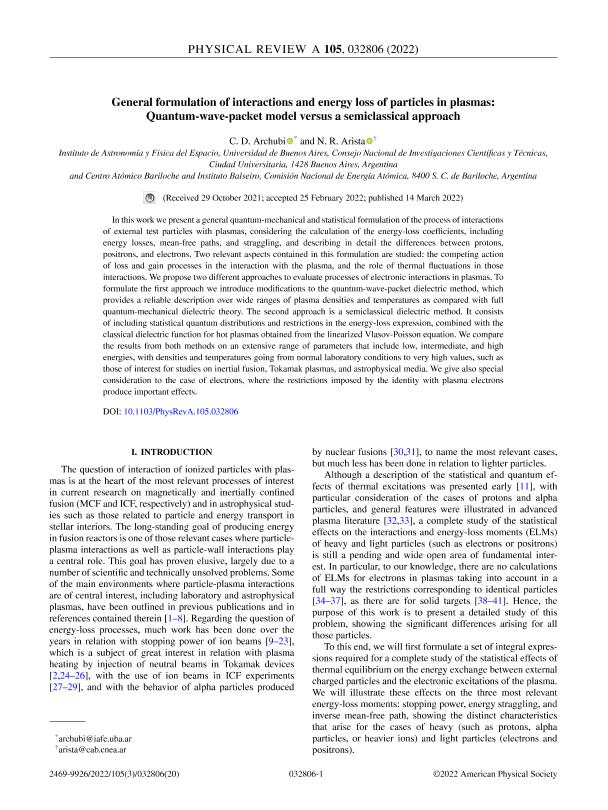Mostrar el registro sencillo del ítem
dc.contributor.author
Archubi, Claudio Darío

dc.contributor.author
Arista, N. R.
dc.date.available
2023-10-12T12:00:46Z
dc.date.issued
2022-03
dc.identifier.citation
Archubi, Claudio Darío; Arista, N. R.; General formulation of interactions and energy loss of particles in plasmas: Quantum-wave-packet model versus a semiclassical approach; American Physical Society; Physical Review A: Atomic, Molecular and Optical Physics; 105; 3; 3-2022; 1-20
dc.identifier.issn
1050-2947
dc.identifier.uri
http://hdl.handle.net/11336/214957
dc.description.abstract
In this work we present a general quantum-mechanical and statistical formulation of the process of interactions of external test particles with plasmas, considering the calculation of the energy-loss coefficients, including energy losses, mean-free paths, and straggling, and describing in detail the differences between protons, positrons, and electrons. Two relevant aspects contained in this formulation are studied: the competing action of loss and gain processes in the interaction with the plasma, and the role of thermal fluctuations in those interactions. We propose two different approaches to evaluate processes of electronic interactions in plasmas. To formulate the first approach we introduce modifications to the quantum-wave-packet dielectric method, which provides a reliable description over wide ranges of plasma densities and temperatures as compared with full quantum-mechanical dielectric theory. The second approach is a semiclassical dielectric method. It consists of including statistical quantum distributions and restrictions in the energy-loss expression, combined with the classical dielectric function for hot plasmas obtained from the linearized Vlasov-Poisson equation. We compare the results from both methods on an extensive range of parameters that include low, intermediate, and high energies, with densities and temperatures going from normal laboratory conditions to very high values, such as those of interest for studies on inertial fusion, Tokamak plasmas, and astrophysical media. We give also special consideration to the case of electrons, where the restrictions imposed by the identity with plasma electrons produce important effects.
dc.format
application/pdf
dc.language.iso
eng
dc.publisher
American Physical Society

dc.rights
info:eu-repo/semantics/openAccess
dc.rights.uri
https://creativecommons.org/licenses/by-nc-sa/2.5/ar/
dc.subject
INTERACTIONS
dc.subject
PLASMAS
dc.subject
QUANTUM
dc.subject
MODEL
dc.subject.classification
Física Atómica, Molecular y Química

dc.subject.classification
Ciencias Físicas

dc.subject.classification
CIENCIAS NATURALES Y EXACTAS

dc.title
General formulation of interactions and energy loss of particles in plasmas: Quantum-wave-packet model versus a semiclassical approach
dc.type
info:eu-repo/semantics/article
dc.type
info:ar-repo/semantics/artículo
dc.type
info:eu-repo/semantics/publishedVersion
dc.date.updated
2023-10-11T15:01:43Z
dc.identifier.eissn
2469-9934
dc.journal.volume
105
dc.journal.number
3
dc.journal.pagination
1-20
dc.journal.pais
Estados Unidos

dc.journal.ciudad
New York
dc.description.fil
Fil: Archubi, Claudio Darío. Consejo Nacional de Investigaciones Científicas y Técnicas. Oficina de Coordinación Administrativa Ciudad Universitaria. Instituto de Astronomía y Física del Espacio. - Universidad de Buenos Aires. Facultad de Ciencias Exactas y Naturales. Instituto de Astronomía y Física del Espacio; Argentina
dc.description.fil
Fil: Arista, N. R.. Comisión Nacional de Energía Atómica. Centro Atómico Bariloche; Argentina
dc.journal.title
Physical Review A: Atomic, Molecular and Optical Physics

dc.relation.alternativeid
info:eu-repo/semantics/altIdentifier/doi/https://doi.org/10.1103/PhysRevA.105.032806
Archivos asociados
